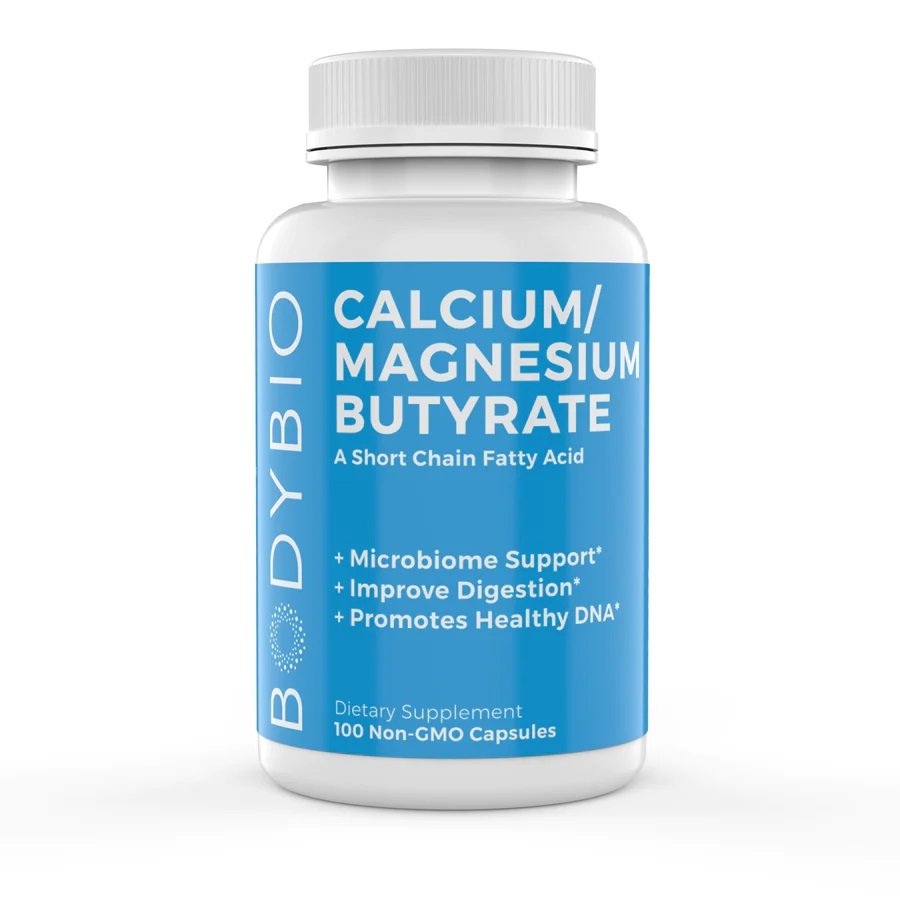BodyBio Calcium Magnesium Butyrate Supplement




BodyBio Calcium Magnesium Butyrate Supplement
BodyBio Butyrate Supplement
Calcium Magnesium Butyrate | Gut Health Supplement
Butyrate is an essential end product of a healthy microbiome. Primarily, it fuels your gut cells, strengthening the gut lining and healing leaky gut*
Butyrate is an important short chain fatty acid (along with acetate, propionate and valerate) that is produced by gut bacteria via the fermentation of dietary fibre. Not only is Butyrate critical in repairing the gut lining (and thus helping repair leaky gut) but also promotes the health of colon cells —it also supports healthy inflammation response to protect the body from disease while improving immune function & gut health*.
Butyrate is arguably the most important of the short chain fatty acids in the gut that provides effective gut health supplementation supporting digestive and brain health, while also protecting against disease.* Backed by over 5000 scientific studies including human clinical trials, Simply put butyrate is an essential end product of a healthy microbiome.
6 Benefits From Butyrate Supplementation
PROTECTS THE GUT & FIGHTS COLONIC INFLAMMATION*
SUPPORTS BLOOD SUGAR BALANCE & METABOLIC HEALTH*
REGULATES THE IMMUNE SYSTEM*
IMPROVED DIGESTIVE SUPPORT: LESS BLOAT, GAS & CRAMPING*
SUPPORTS HEALTHY COLONIC MOTILITY/REGULARITY*
FIGHTS PERMEABILITY - MAJOR FUEL SOURCE FOR CELLS LINING THE LARGE INTESTINE*
What is Butyrate?
Butyrate is one of the essential short chain fatty acids (SCFA) produced naturally by intestinal gut bacteria. It can also be found in dairy products albeit much smaller quantities than that produced by the gut microbes or a butyrate supplement. Butyrate functions as a primary source of energy and anti-inflammatory mediator to the cells lining the large intestine. This helps to maintain healthy gut flora and promote optimal digestive health, maintaining healthy gut lining as well as assisting in maintaining healthy levels of good gut bacteria.*
Butyrate repairs the damage that pesticides, toxins, processed foods, drugs, etc has done to the gut lining.. Butyrate helps to heal the gut lining and promotes healthy DNA to support genetic function against damage, which may lead to disease*.
For an in-depth article on Butyrate check out this review “Butyrate Health Benefits - Your Gut Bacteria's Super Weapon”
Butyrate: Gut Health Supplement's Role in the Body
Butyrate is an effective gut health & gut microbiome supplement with full-body benefits. Not only is Butyrate critical in repairing the lining of the gut and the health of cells within it — it also supports a healthy inflammation response to protect the body from disease while improving immune function*.
Butyrate boats an extensive history of research backed by over 5000 scientific studies, including human clinical trials.
The research has pretty clearly established that Butyrate is the predominant fuel source for intestinal epithelial cells (gut cells), which is unique as most other human cells use glucose as their main energy source. Approximately 95% to 99% of all short chain fatty acids (SCFAs) produced in the colon are rapidly absorbed and used as energy by colonic cells.
Altered gut microbiome / dysbiosis has been consistently been identified in diseases such as Parkinson’s Disease, Inflammatory Bowel Disease (Ulcerative colitis and Crohn’s Diseases), Type 2 diabetes, Constipation dominant IBS in which the common finding is low levels of butyrate producing bacteria and subsequent low levels of butyrate when compared to healthy individuals.
Another quite fascinating quality of butyrate is its antifungal properties - studies have shown butyrate can strongly inhibit yeast growth including Candida albicans (inhibiting filamentation) & Cryptococcus neoformans (inhibiting melanization and capsule formation). Butyrate has also been shown to a potent yeast and candida biofilm disruptor and increases the effectiveness of conventional antifungal medication such as azole drugs
When butyrate & the other short chain fatty acids are absorbed into the bloodstream, they quickly goes to work throughout the body.
It supports a healthy inflammation response, protecting the body from disease while regulating immune function.*
It helps balance insulin and blood sugar levels.*
It clears brain fog and boosts brain function.*
It supports healthy DNA and cell differentiation, our cells’ ability to change into a specific type like a heart cell or a kidney cell.*
How To Select the Right Butyrate Supplement?
When choosing a Butyrate supplement to help improve butyrate levels, it is important to make sure that you select one that is of the highest quality and potency. Look for supplements that are free from artificial ingredients, as this ensures maximum efficacy & minimises the possibility of side effects. Additionally, pay attention to the dosage of butyrate in each serving.
BodyBio also have a straight Sodium Butyrate Supplement, which is much the same as their Calcium/Magnesium Butyrate version - the difference between the two formulas is the minerals used to bind the butyric acid, i.e.. Sodium vs Calcium & Magnesium which act as a buffer to allow the butyric acid to reach the gut. All in all the Butyrate concentration is identical. So which Butyrate Supplement is better between the two formulas? We stock and use the Calcium/Magnesium Butyrate formula simply to avoid adding any additional sodium to ones daily intake.
Why BodyBio Butyrate?
Quality matters! BodyBio don’t use fillers or additives. There is no way to achieve the powerful benefits of butyrate without its distinctive, fermented scent. This means it's premium quality and ready to work. All natural ingredients and free of wheat, gluten, yeast, corn, soy, dairy, artificial colors, and resins.
BodyBio Butyrate Supplement Specially formulated to:
Support gut health*
Increase butyrate levels*
Promote detoxification*
Maintain proper pH levels in the colon*
Reduce inflammation and decrease gastrointestinal symptoms*
Promote healthy DNA function*
Support healthy blood sugar regulation and improve insulin resistance*
Butyrate serves to close tight junctions and promote good bacteria growth and prevent dysbiosis commonly known as leaky gut*
BodyBio Calcium Magnesium Butyrate Ingredients
Butyric Acid, Calcium Hydroxide, Magnesium Hydroxide, Medium Chain Triglycerides (MCT), Hydroxyproply Methyllulose and Purified Water.
Suggested Use
1-2 capsules with food, unless otherwise suggested by your Healthcare Professional.
What To Expect When You Start Taking Butyrate supplements
0-2 Weeks
Colonocytes are energized. Some people notice a difference within the first day of taking Butyrate while others notice improvement in their digestive health within the first week. As butyrate levels build over time, you will notice more positive changes.
2-4 Weeks
Works quickly to balance your digestive function, resolve leaky gut, support a healthy gut flora, and balance your blood sugar response (serum glucose levels), all while helping to keep you regular with well-formed stools*
4 Weeks+
Gradually builds a healthy gut structure over time, supporting your immune resistance, subsiding systemic inflammation in the gut, resolving mental fog, helping weight regulation, and improving your overall health.
FAQ’s
Is Butyrate enterically coated? How do I know it makes it to the gut?
The capsules of butyrate are vegetarian, made from plant cellulose. The butyrate powder within is enterically coated. Because butyrate has systemic benefits, some must then be absorbed in the upper GI tract. What people look for is to get butyrate to the colon. Here, an approach has been devised to tackle the challenge of butyrate delivery—coating with a vegetable fat, commonly cited as a medium-chain triglyceride. The rationale behind this is that a significant part of the butyrate will be released only when lipase is secreted in the duodenum.
Why do you use butyric acid?
BodyBio’s butyrates are simply butyrate, a thirteen-atom complex joined to an alkali. Butyric acid, butyrate and tributyrin are ingredients you may see in this category of supplements- same purpose, different characteristics. We use butyric acid aka butanoic acid, a short chain fatty acid with four carbon atoms at its heart (found in butter, hence its name). As an acid, it has a low pH so we compound it with an alkali, a combination that forms a salt + water. At this stage, we no longer have butyric acid, but butyrate, a buffered form of butyric acid.
Is butyrate supposed to smell?
Yes, and we do not use any additives or fillers to mask the scent. Butyrate is quite infamous for its scent because it is a molecule naturally produced by the body to feed colon cells. We create butyrate exactly as it’s formed in the colon - through the bacterial fermentation of resistant starch. In its organic state, butyric acid is surrounded by the body’s unwanted debris. So, naturally, it doesn’t smell good. Substances sometimes added to butyrate in order to control its aroma interfere with butyrate’s character. Butyrate need only speak for itself as the analeptic substance it is
Are Butyrate Supplements similar to a probiotic?
No, Butyrate is not bacteria but a short chain fatty acid (SCFA) made in the lower colon by bacteria and taken up by the colonocytes, the cells that line the colon. It then becomes an important food for those cells. Lacking good bacteria in our colon, such as when we take antibiotics, can lead to an insufficient supply of butyrate.
Are there any side effects from taking Butyrate?
No, but you may be more “regular” - not exactly a bad thing!
Is Butyrate needed on Paleo/Keto diets?
These diets can be deficient in fiber & resistant starch and therefore, low in butyrate if proper dietary guidelines are not followed. When a paleo diet is properly followed, an individual should be consuming between 9-12 cups of phytonutrient and fiber rich plant foods including, green plantains, green bananas, sunchokes, artichokes, cooked and cooled potatoes, etc. in order to produce ample levels of butyrate. The problems arise when individuals focus on animal protein and fat while neglecting these plant foods/fibers.
9 cups of vegetables contain roughly 72 grams of fiber. Remember, we must also consider the health of the individual's microbiome. This factor will also influence butyrate production.
The ability for your body to synthesize butyrate depends on several factors. Dietary fiber and resistant starch intake are critical, but we also need a plethora of commensal bacteria to ferment the fiber that we eat and synthesize it into butyrate, acetate, and propionate. The state of the microbiome, the impact of drugs, alcohol, etc. factors into each individual's ability to produce short chain fatty acids like butyrate.
Chronic over nutrition via processed, nutrient void foods high in energy, fat and sugar is the norm amongst the majority of North Americans. This dietary regimen creates a situation where gut health is greatly compromised and therefore, butyrate production is greatly impaired. One cannot go wrong eating a nutrient dense diet filled with high quality animal protein and colorful, fiber rich foods.
It is important to note that most studies on butyrate are done via butyrate supplementation. Regardless of whether you are making adequate butyrate in the gut, we don't think you can go wrong by supporting your body with a top up of butyrate through supplementation. Butyrate supplementation has been showing to support a healthy gut inflammation response, improve gut integrity, inhibit histone deacetylase, blunt NF-Kappa B down, regulate activated microglia cells, and improve the gut/brain axis.
If taking medication, pregnant, or breastfeeding please consult a licensed healthcare provider before taking this supplement. Vitamin supplements should not replace a balanced diet. Always read the label. Use as directed. If symptoms persist, talk to your health professional.
*These statements have not been evaluated by the Food & Drug Administration or TGA. These products are not intended to diagnose, treat, cure or prevent any disease. The information contained herein is for informational purposes only and does not establish a doctor-patient relationship.


